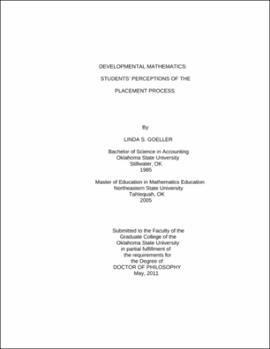| dc.contributor.advisor | Lamphere-Jordan, Patricia | |
| dc.contributor.author | Goeller, Linda S. | |
| dc.date.accessioned | 2013-11-26T08:34:29Z | |
| dc.date.available | 2013-11-26T08:34:29Z | |
| dc.date.issued | 2011-05 | |
| dc.identifier.uri | https://hdl.handle.net/11244/7409 | |
| dc.description.abstract | Scope and Method of Study: | |
| dc.description.abstract | Eighty-two students participated in this mixed methods study. The study used qualitative and quantitative data to consider the perceptions of students concerning the placement process at a southwestern community college. Student satisfaction was compared to other factors such as pace of course and scores on the placement test. A survey was administered to participants in a summer and fall semester. Two students from each semester participated in interviews to provide more insight concerning the placement process. A content analysis comparing the placement test and a departmental pretest was performed. | |
| dc.description.abstract | Findings and Conclusions: | |
| dc.description.abstract | Seventy-two percent of the students stated they had been properly placed. A content analysis was conducted to compare the COMPASS placement test and a departmental pretest. Differences were found between the two tests, but student comments indicated a belief that the two tests were similar. A significant relationship was found between students' feelings of proper and improper placement and student satisfaction with pace of course at a 0.05 alpha level. A significant relationship was also found to exist between student satisfaction with pace of course and length of time since the last math course when using a Spearman rank correlation at the alpha level of 0.05. Emerging patterns that developed from this study concerned communication, student responsibility, and student input. The study revealed that college personnel and students must learn to communicate clearly concerning the placement process to increase efficiency, student satisfaction, and retention. Student responsibility emerged as a key component in increasing the effectiveness of the placement process. In order for communication and student responsibility to increase, students must be given a voice in the placement process. The research in this study opened up many other questions concerning the placement of students in developmental mathematics courses. | |
| dc.format | application/pdf | |
| dc.language | en_US | |
| dc.rights | Copyright is held by the author who has granted the Oklahoma State University Library the non-exclusive right to share this material in its institutional repository. Contact Digital Library Services at lib-dls@okstate.edu or 405-744-9161 for the permission policy on the use, reproduction or distribution of this material. | |
| dc.title | Developmental mathematics: Students' perceptions of the placement process | |
| dc.contributor.committeeMember | Utley, Juliana | |
| dc.contributor.committeeMember | Redmond, Adrienne | |
| dc.contributor.committeeMember | Choike, James | |
| osu.filename | Goeller_okstate_0664D_11360 | |
| osu.accesstype | Open Access | |
| dc.type.genre | Dissertation | |
| dc.type.material | Text | |
| dc.subject.keywords | developmental education | |
| dc.subject.keywords | pace of course | |
| dc.subject.keywords | placement process | |
| dc.subject.keywords | retention | |
| dc.subject.keywords | student satisfaction | |
| thesis.degree.discipline | Professional Education | |
| thesis.degree.grantor | Oklahoma State University | |
